MercoPress. South Atlantic News Agency
Tag: Central Bank of Brazil
-
Thursday, May 8th 2025 - 10:41 UTC
BCB ups Selic rate to 14.75% per annum

Brazil's Central Bank's (BCB) Monetary Policy Committee (Copom) unanimously decided Wednesday to raise the Selic benchmark rate by 0.5 percentage points to 14.75% per year, consolidating a contraction cycle. This decision was driven by high food and energy prices and global economic uncertainties, and the financial markets were expecting the move.
-
Sunday, February 9th 2025 - 19:38 UTC
Brazil’s interest rate raised to 13.25% and further increases forecasted
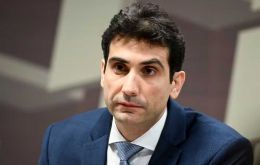
Brazil's central bank raised its benchmark interest rate, Selic, by 100 basis points for the second straight meeting last Wednesday and anticipated another similar hike in March, concerned about mounting inflationary pressures.
-
Wednesday, January 22nd 2025 - 09:30 UTC
Brazilian Central Bank report foresees 5.08% inflation for this year

The Focus Bulletin released earlier this week by Brazil's Central Bank (BCB) projected a 5.08% inflation for this year in South America's largest country. The new prediction represented a slight twitch from last week's 5% National Consumer Price Index (IPCA). Meanwhile, Brazil's Gross Domestic Product (GDP) - the sum of goods and services produced in the country - is expected to grow by 2.04% in 2025, a slight improvement from 2.02% the week before.
-
Friday, December 20th 2024 - 10:30 UTC
Brazil's real recovers against US dollar

Brazil's Central Bank (BCB) successfully maneuvered Thursday and got the US dollar to fall against the local real after volatility gripped financial markets amid President Luiz Inácio Lula da Silva's planned taxation reforms, Agencia Brasil reported. The US currency closed at R$ 6.12 following Congressional approval of the Government's legal package.
-
Wednesday, December 18th 2024 - 10:22 UTC
Brazil: Selic rate expected to keep growing next year
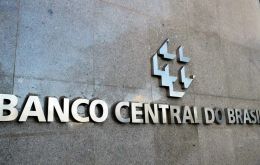
Brazil's Central Bank's (BCB) Monetary Policy Committee (Copom) said Tuesday in a document that further hikes to the basic interest rate (Selic) were not to be ruled out next year given the rise of the US dollar against the Brazilian real, which crossed the BR$ 6 / US$ 1 barrier after the fiscal package announced by the Government of President Luiz Inácio Lula da Silva in recent days negatively impacted the market.
-
Saturday, November 30th 2024 - 10:25 UTC
Brazil: US dollar pierces R$ 6 barrier

The US dollar closed for the first time above the psychological R$ 6 barrier on another turbulent day in Brazil's markets, Agencia Brasil reported. The local scene continued to reverberate after the spending cut package announced earlier this week by Finance Minister Fernando Haddad, also impacting the stock exchange scene during the day.
-
Thursday, September 19th 2024 - 08:00 UTC
Brazilian central bank raises Selic rate to 10,75%, fearing inflation resurgence

While the United States Federal Reserve decided to cut its reference interest rate arguing inflation was under control, Brazil's Central Bank decided the opposite and actually hiked 25 bases point its already high Selic benchmark from 10,50% to 10,75%.
-
Thursday, August 1st 2024 - 09:07 UTC
Brazil's Copom keeps Selic unchanged
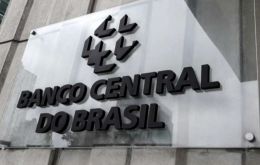
Brazil's Central Bank (BCB) Monetary Policy Committee (Copom) unanimously agreed Wednesday to keep the Selic basic interest rate at 10.5% per year, Agencia Brasil reported. The measure followed through on June's decision to stop the downward cycle that spanned from August last year until March this year, during which the Selic was lowered by 0.5 percentage points at each meeting until in May it was 0.25 percentage points.
-
Tuesday, June 25th 2024 - 09:41 UTC
Brazil's yearly inflation projection adjusted slightly upwards
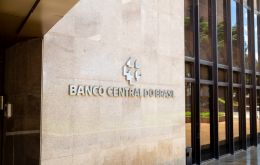
Brazil's Central Bank (BCB) Monday released the latest edition of its Focus Bulletin showing a slight upward adjustment in the Broad National Consumer Price Index (IPCA) from 3.96% to 3.98% this year, Agencia Brasil reported. The index is considered the country's official inflation. The weekly survey among leading financial institutions also projected an increase from 3.8% to 3.85% next year while for 2026 and 2027 the forecasts were 3.6% and 3.5% respectively.
-
Thursday, June 20th 2024 - 15:25 UTC
Fearing inflation ahead, Brazil's central bank leaves basic rate unchanged at 10,50%
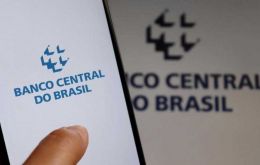
With budget overspending and prospects of higher inflation in weeks ahead, the Brazilian central bank, independent from the Executive, kept the Selic rate unchanged at 10.50%. This means there are no expectations for a resumption of the rates easing cycle this year.
